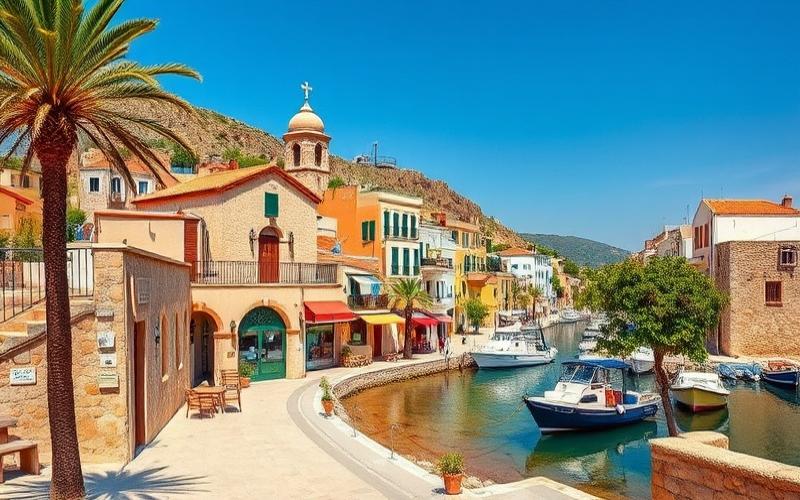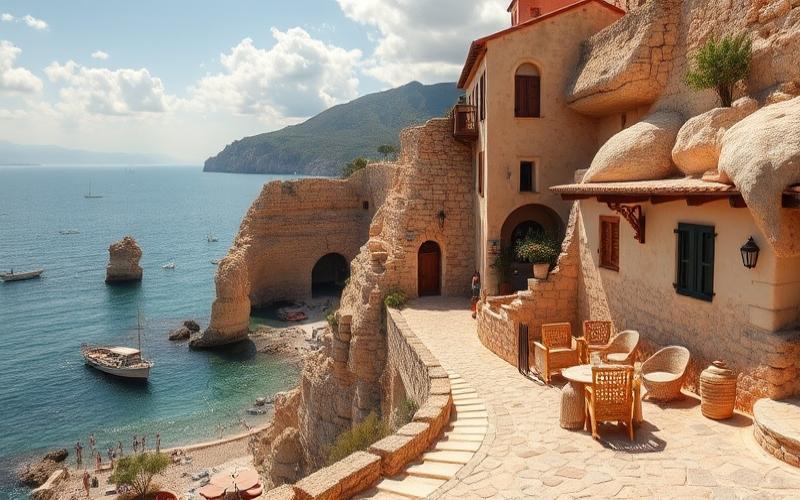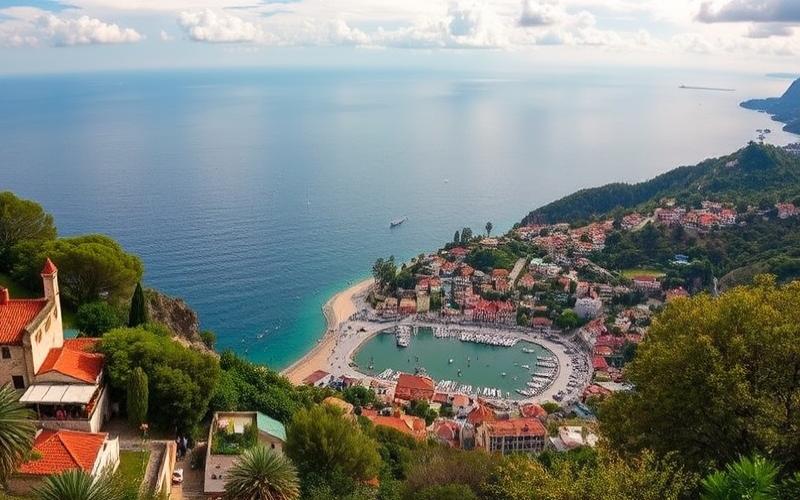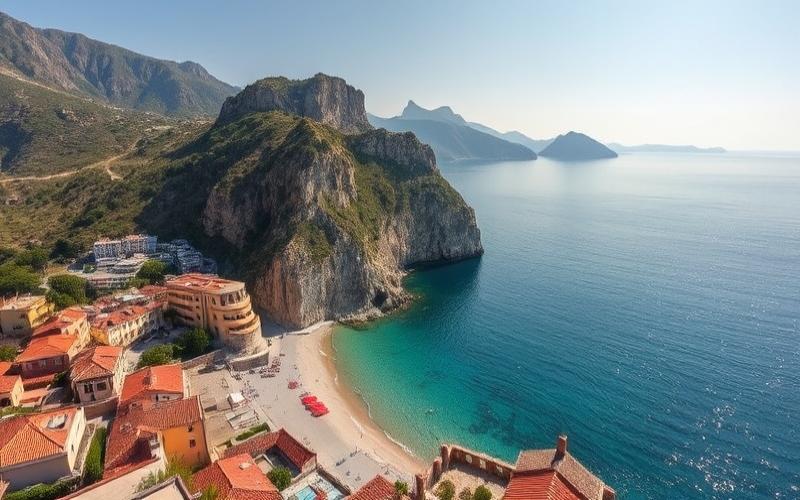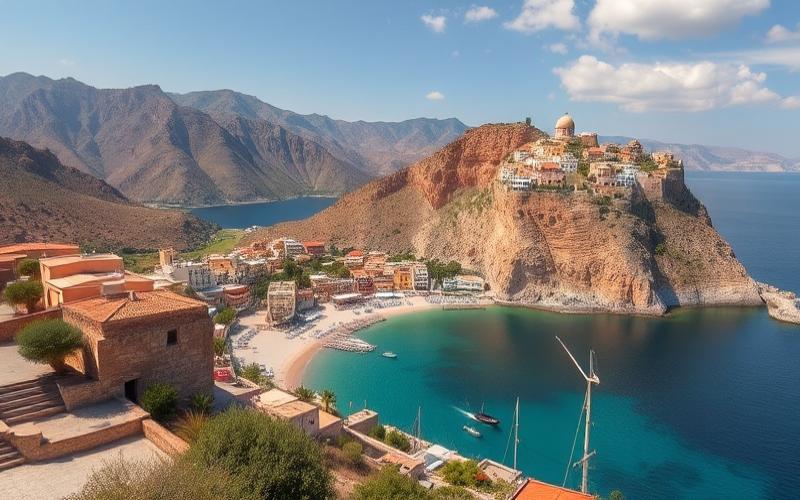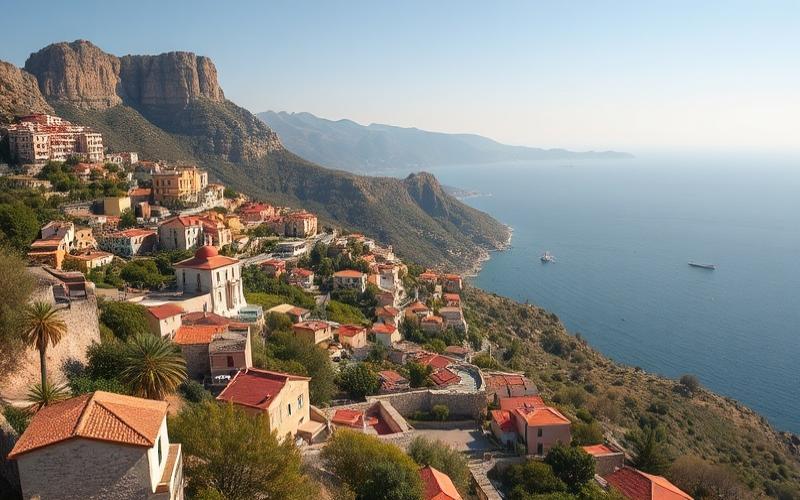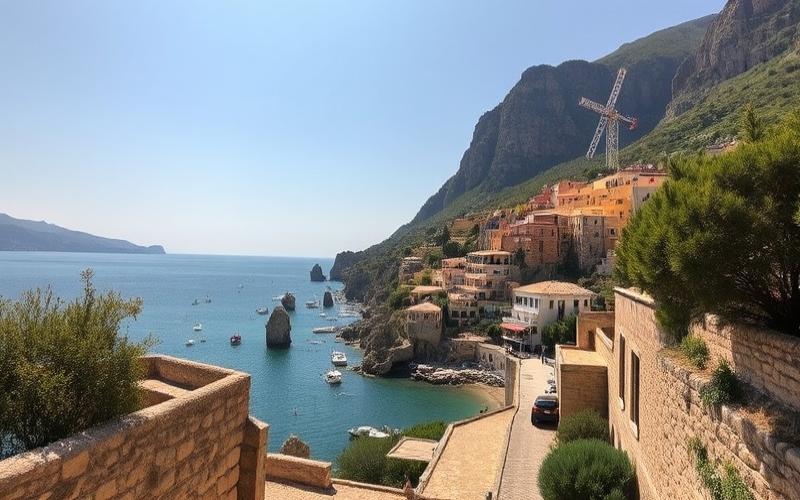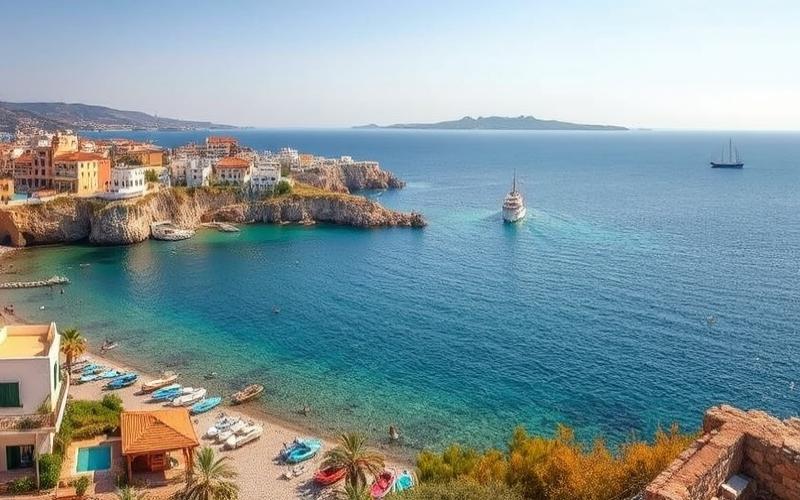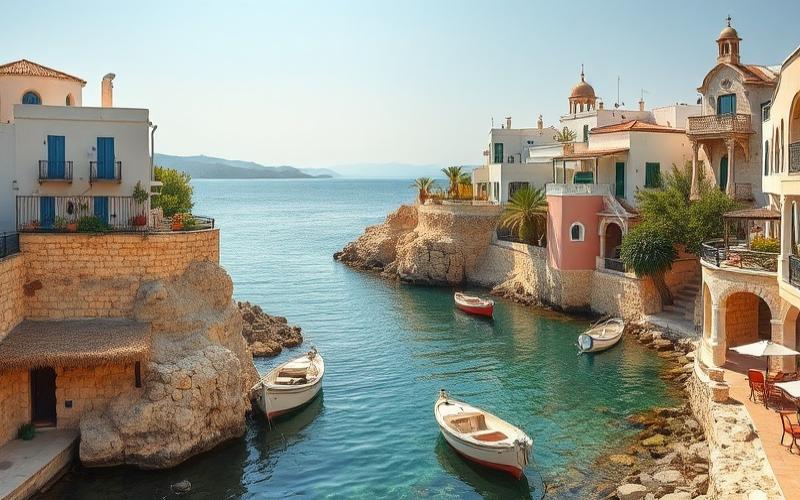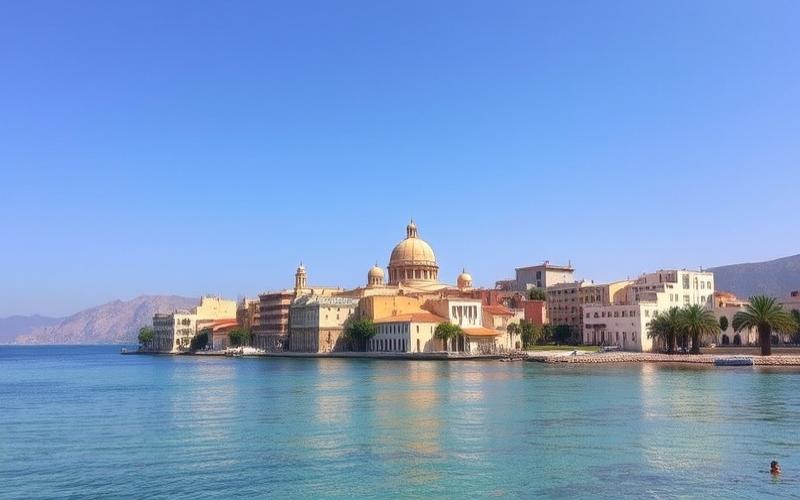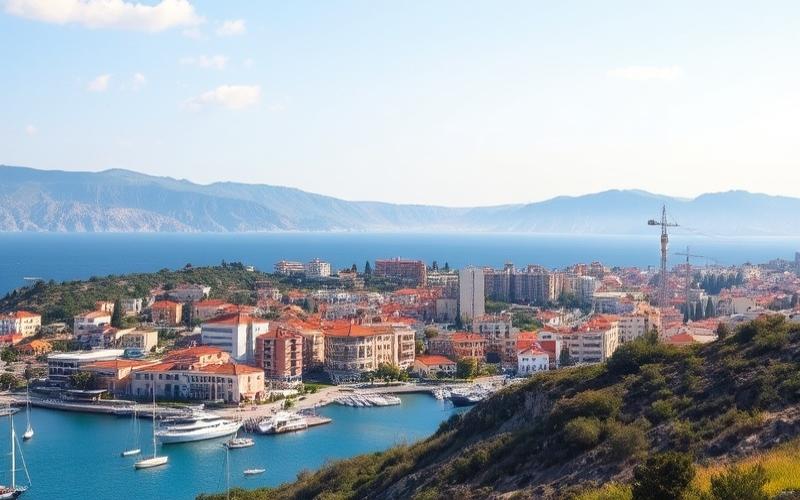
 Published on and written by Cyril Jarnias
Published on and written by Cyril Jarnias
Buying a Hotel in Cyprus: A Promising Investment
Purchasing a hotel in Cyprus can be a promising venture for investors seeking opportunities in the Mediterranean tourism sector. This country, renowned for its picturesque landscapes and enchanting climate, attracts an increasing number of visitors each year.
Complete Checklist for a Successful Investment
To succeed in this investment, it’s crucial to have a comprehensive checklist that covers all essential aspects of the acquisition:
- Location selection
- Legal procedures
- Financing opportunities
- Effective management strategies
This in-depth guide is designed to help you navigate through each step of the process, transforming your hotel project into lasting success.
Cyprus Hotel Market Overview
The current state of Cyprus’ hotel market is characterized by recovery dynamics and cautious optimism, supported by positive booking indicators for 2025, but also marked by certain structural and contextual challenges.
Recent Trends
- Advance hotel bookings for the first half of 2025 show notable growth compared to the same period in 2024.
- Hotel occupancy rates during Easter reached approximately 75%, thanks to the exceptional coincidence of Orthodox, Catholic, and Jewish holidays.
- Following this seasonal peak, a slight decline in bookings is expected as holidays end.
- Main tourist clientele comes from the United Kingdom, Poland, Germany, and Israel.
Market Evolution and Key Statistics
| Indicator | Value / Trend (2025) |
| Hotel market size | €1.2 billion |
| Estimated hotel sector revenue | US$73.16 million |
| Easter occupancy rate | ~75% |
| Advance bookings | Increasing vs. 2024 |
Most Popular Tourist Areas
- Paphos: Flagship destination with strong year-round demand; the region advocates for increased capacity during low season.
- Ayia Napa, Limassol, Protaras: Other major hubs focused on beach tourism.
- The capital Nicosia mainly attracts business tourism.
Impact of Tourist Seasons
Hotel attendance shows strong seasonality:
- Peak between May and October (summer season).
- Winter marked by significant decline in occupancy rates despite some initiatives to extend off-season activity in regions like Paphos.
Hotel Market Segments
| Segment | Main Characteristics | Current Dynamics |
| Luxury | High-end coastal resorts; affluent international clientele | Stable demand |
| Mid-range | Renovated hotels; good value for money | Strong family appeal |
| Economy | Affordable urban or suburban offerings | Growth among young travelers |
The hotel inventory remains mostly composed of establishments built in the 1980s-1990s but having recently benefited from government incentive programs allowing their renovation or modernization.
Forecasts & Sector Outlook
Projections indicate:
- Moderate annual growth in coming years provided current trends continue.
- If the first half exceeds that observed in 2024—already considered positive—the entire year should follow this upward trend.
Opportunities & Challenges for Investors
Opportunities:
- Public incentive programs facilitating hotel renovation/modernization
- Possible diversification toward sustainable or themed tourism (wellness, MICE)
Challenges:
- Partial aging of real estate inventory requiring heavy investments;
- Persistent volatility in certain major source markets (e.g., United Kingdom) due to global economic uncertainties;
- Increased management of natural resources (e.g., growing water needs driving costly desalination unit development);
“Although we are cautiously optimistic… we must be prepared for any change” – President, Cyprus Hotel Association
Recent global events strongly influence the sector: international economic uncertainties particularly impacting the British pound’s purchasing power; increased need for local players to be flexible in response to regional geopolitical fluctuations.
In summary, Cyprus shows strong recovery mainly driven by its historical markets but must contend with aging infrastructure as well as notable dependence on key segments and peak periods.
Good to Know:
The hotel market in Cyprus is undergoing significant transformation, influenced by recent increases in hotel occupancy, with an average occupancy rate of 70% in 2023, and rising average room rates reaching €120 per night. Leading areas like Paphos and Limassol continue to attract more tourists, especially during the peak summer season, while luxury and mid-range hotel segments continue to thrive. The impact of tourist seasons remains significant, with peak attendance during summer, but new strategies are focusing on extending the season through business and wellness tourism. Investors must navigate between opportunities, such as the rise of sustainable tourism, and challenges, including dependence on British and Russian markets. Recent global events, like the pandemic, have also heightened attention on operational flexibility of establishments. Forecasts indicate stable growth, though conditional on global economic stability and local infrastructure investments.
Taking Over a Hotel in Cyprus: What You Need to Know
Key Elements to Consider When Taking Over a Hotel in Cyprus
- Verification of legal and financial situation:
- Examine property title, absence of disputes or mortgages on the hotel.
- Analyze current contracts (suppliers, staff, lease).
- Review financial statements from recent years to assess profitability and detect potential hidden debts.
- Ensure compliance with local and European standards for public establishments.
- Evaluation of current management:
- Study staff organizational chart and their contracts.
- Verify internal procedures (reception, housekeeping, security).
- Check condition of electrical installations and conduct complete audit to anticipate potential mandatory work.
Physical Analysis of Premises
| Criterion | Questions to Ask |
|---|---|
| Lease rights | Remaining duration? Rent price? Renewal conditions? |
| Surface area | Sufficient for your objectives? Possibilities for expansion or redevelopment? |
| Deterioration | Well-maintained premises? Urgent work needed? |
| Safety compliance | Fire/public establishment standards met (safety commission approval)? |
Potential Improvements
- Modernization of rooms or common areas
- Implementation of digital offerings (online bookings)
- Sustainable development: energy savings, responsible management
Location & Tourist Trends
- Location is crucial: proximity to beaches/historical sites/urban centers highly sought after.
- Major tourist areas are Limassol, Paphos, Ayia Napa and Larnaca.
- Observe trends: expected increase in international tourism post-pandemic with growing demand for luxury but also sustainable tourism.
Regulatory & Tax Aspects Specific to Cyprus
- Strict regulation on compliance with European hotel safety standards.
- Advantageous taxation with one of Europe’s lowest corporate tax rates (12.5%).
- VAT applicable on certain real estate transactions; consult local tax advisor during financial structuring.
Essential Steps in the Process
- Preliminary legal and financial audit
- Complete technical inspection by certified office
- Possible negotiation based on required work/standard upgrades
- Contract signing under Cypriot notarial supervision
- Registration with competent authorities
Useful Local Resources
- Real estate agents specialized in Cypriot hospitality
- Local hospitality consultants mastering island-specific regulations
- Bilingual law firms accustomed to international transactions
- Locally established accounting firms
Anticipation is essential throughout the journey: each administrative step often takes more time than in mainland France; it’s advisable to be accompanied by several local experts from the beginning to avoid any subsequent surprises.
Quick Checklist
- Thorough legal/tax verification
- Independent technical assessment
- Rigorous location/market trends evaluation
- Support from multilingual local experts
Good to Know:
When taking over a hotel in Cyprus, it’s crucial to verify its legal and financial situation, including existing debts and ongoing disputes, as well as the state of current management to identify improvements needed, such as infrastructure renovation or service optimization. Location is also determining, considering tourist trends like the growing popularity of coastal regions. It’s essential to familiarize yourself with local regulations, including tax standards specific to foreign investments and hotel operating license requirements. Collaborating with local resources, such as specialized real estate agents or hospitality consultants, can provide strategic advantage by offering valuable market insights and facilitating the acquisition process.
Hotel Due Diligence Guide in Cyprus
Key steps for effective due diligence when purchasing a hotel in Cyprus:
- Property identification, collection of basic documents and initial examination by real estate agent.
- Thorough verification by lawyer through official registries: actual ownership, encumbrances (mortgages, seizures), ongoing litigation.
- Examination of architectural plans and building permits to identify unauthorized constructions or missing licenses.
- Land zoning control to ensure hotel operation complies with official land designation.
- Analysis of current commercial contracts (lease, subcontracting, suppliers).
- Social audit: potential employee transfer and verification of legal personnel obligations compliance.
| Step | Objective | Involved Parties |
|---|---|---|
| Title & encumbrance verification | Guarantee full ownership | Lawyer |
| Plans & compliance | Ensure legality of all constructions | Architect/Lawyer |
| Tax & accounting analysis | Assess financial sincerity & tax risks | Accountant |
| Social audit | Examine staff transfer/takeover | Lawyer/HR Advisor |
Local Regulations to Know:
- Strict compliance with Cypriot cadastre and meticulous verification at Land Registry Department.
- Compliance with local urban planning and environmental standards; particular attention to hotel zoning.
- Specific social obligations: possible automatic takeover of existing employees with maintained benefits; need to audit all existing individual or collective contracts.
Importance of Property Valuation and Title Verification:
An independent valuation allows:
- Setting fair market value based on real potential (location, general condition, operational level).
- Anticipating potential renovation or standard upgrade needs.
Legal verification should focus on:
- Complete absence of undeclared mortgage or land dispute
- Complete legality of auxiliary constructions
- Real rights attached to the land
Essential Financial and Tax Aspects:
Checklist to control:
- Certified annual accounts for multiple fiscal years
- Past tax declarations (local VAT, Corporate Tax)
- Effective compliance with all declarative obligations to Cypriot authorities
- Potential social/tax debts
- Hidden risks like subsequent tax adjustments
Human Resources Considerations:
To systematically audit:
- Complete staff list with seniority/status/salary/contractual benefits
- Individual contracts/applicable collective agreements
- Risks related to automatic transfer (“automatic transfer of undertakings”)
- Latent social liabilities (potential indemnities)
Specific Risks in Cypriot Market:
Main list:
- Frequent problems related to old or irregular cadastral compliance
- Possible cases of hotel operations on initially residential land leading to administrative/fiscal sanctions
- Potential difficulty in quickly obtaining/renovating certain hotel licenses depending on locality
Best Practices to Mitigate These Risks:
Systematically frame each transaction with a multidisciplinary team including experienced local lawyer, notary specialized in commercial hospitality, and trilingual accountant.
Require strong contractual guarantees from seller regarding hidden fiscal/social/legal liabilities.
Plan regular post-acquisition audits to anticipate any regulatory changes affecting operations.
Successful acquisition always requires rigorous approach combining exhaustive legal analysis, sharp financial audit, and perfect mastery of local HR specifics.
Practical Summary:
- Always engage local expert lawyer before any deposit payment
- Never neglect or simplify social issues even during simple asset purchase
- Systematically request written guarantees covering all prior risks
Good to Know:
Hotel due diligence in Cyprus involves several key steps to secure successful investment. It’s crucial to verify property titles and accurately assess real estate assets, considering complex local regulations. It’s imperative to meticulously review financial statements and familiarize yourself with Cyprus-specific tax obligations to avoid surprises. Investors must also examine employment contracts and comply with personnel laws, including dismissal conditions and legal working requirements, to ensure harmonious employee relations. The Cypriot market presents risks like economic fluctuations and seasonal variations, and collaborating with local experts is advised to mitigate them. Finally, staying informed about best practices, such as integrating sustainable solutions and diversifying services, can enhance establishment profitability and appeal.
Cyprus Tourism Statistics and Their Impact on Hotel Investment
Tourist arrivals in Cyprus have reached historic highs in recent months, confirming robust growth dynamics. In February 2025, the country welcomed 133,760 tourists, a 7% increase compared to the same period last year. The absolute monthly arrival record was observed in August 2024 with over 554,000 visitors. During the first seven months of the previous year, over 6.6 million passengers transited through the country’s two main airports (Larnaca and Paphos), an unprecedented figure for Cyprus.
| Month | Tourist Arrivals |
| January 2025 | 112,100 |
| February 2025 | 133,760 |
| August 2024 | >554,000 |
Seasonal Trends and Visitor Origins
The tourist peak traditionally occurs during summer (June to September), with a record in August. Winter and early spring see reduced but growing attendance thanks to development of cultural and religious events like Holy Week in Paphos.
Regarding tourist origins:
- British remain the main contingent
- Russians also rank among the most numerous
- Greeks and Swedes complete the podium
Impact on Hotel Demand
This rapid growth strongly stimulates hotel demand:
- In summer, hotel occupancy rates frequently reach maximum.
- Increasing tourist flow encourages modernization or construction of new establishments to meet international expectations.
Concrete examples of recent investments:
- Intensive hotel development in beach areas like Ayia Napa, Limassol or Paphos.
- Major renovations conducted in several five-star complexes to attract high-end clientele.
Influence on Purchase Decisions and Investor Strategies
Strong annual growth encourages:
- Strategies focused on rapid acquisition or expansion while demand is sustained
- Investments targeting not only classic accommodation but also hotel residences and all-inclusive resorts
Adopted strategies:
- Diversification toward sports or medical tourism to smooth seasonality
- Land acquisition near major tourist hubs to anticipate future increases
Future Forecasts & Potential for Investors
Outlook remains very positive:
“Cyprus is currently experiencing strong tourism growth… The trend should continue as Paphos becomes an attractive hub during spring celebrations.”
With these record results—both in numbers and geographical diversity—it’s likely Cyprus will continue its upward trajectory at least until the end of the decade. This creates a favorable context for those wishing to acquire or develop a hotel:
- Expected increase in international air traffic
- Relative political stability favoring foreign direct investment
- Increased off-season potential thanks to targeted marketing efforts
To maximize their return on investment, potential buyers are advised:
- To primarily target highly frequented coastal regions,
- To integrate ecological innovations/climate resilience now,
- To adapt their offerings to growing expectations for personalized experience (wellness/sustainable tourism).
Good to Know:
In 2023, Cyprus welcomed approximately 4 million tourists, with peak attendance during summer months and majority of visitors from the United Kingdom and Russia. This seasonal influx directly impacts hotel demand, leading to notable investments like the recent expansion of Constantinou Bros hotel group which modernized two of its establishments in Paphos. Tourism fluctuations influence purchase strategies, with investors favoring locations offering less dependent seasonality like Limassol with its growing business tourism. Projections indicate stable tourism growth, fueled by government initiatives to diversify source markets, representing attractive opportunity for investors considering hotel purchase or expansion in Cyprus.
Disclaimer: The information provided on this website is for informational purposes only and does not constitute financial, legal, or professional advice. We encourage you to consult qualified experts before making any investment, real estate, or expatriation decisions. Although we strive to maintain up-to-date and accurate information, we do not guarantee the completeness, accuracy, or timeliness of the proposed content. As investment and expatriation involve risks, we disclaim any liability for potential losses or damages arising from the use of this site. Your use of this site confirms your acceptance of these terms and your understanding of the associated risks.


